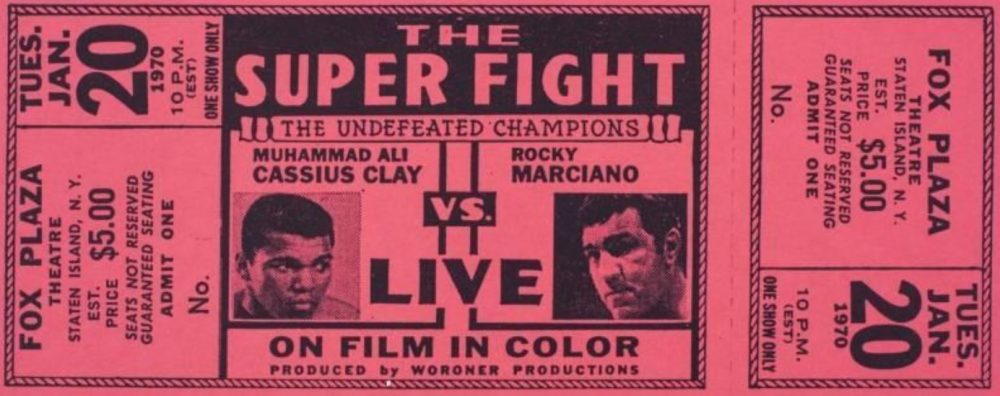Exactly 50 years ago the world sat agog as Muhammad Ali and Rocky Marciano, heavyweight champions from different eras, went to war in a dream fight.
It was the creation of a colourful Miami promoter and disc jockey named Murray Woroner, who concocted the “Super Fight”, a fictional boxing match between Marciano and Ali. It was shot in 1969 and released a year later.
At the time, the pair were the only undefeated heavyweight champions in history (Ali was 27, Marciano was 45). They were filmed sparring for 75 one-minute rounds. Several possible scenarios were acted out, with the result determined by computer algorithms.
In the event, the film was broadcast in 1500 cinemas in North America and Europe. But there was a twist: North Americans were shown a version where Marciano won by 13th-round knockout. The reverse scenario was on offer for European filmgoers.
Of course it was all fun and nonsense. In real life, Marciano died in a plane crash three weeks after filming had ended.
No-one can be sure who would have won a real fight had both been in their prime, but sport fans like little more than fantasy fights and imaginary contests, particularly if there is no live action to take in.
What’s remarkable about the Ali-Marciano “fight” is how realistic it looked, as clips on YouTube make evident.
Ironically, the genre was revisited again this week by a family of German boxing promoters, the Sauerlands (the patriarch of whom owns a holiday home in Cape Town). With boxing, and indeed all sport, on an enforced hiatus due to Covid-19, they produced a heavyweight championship tournament featuring Ali, George Foreman, Lennox Lewis and even Butterbean, among several others, who fought on different nights in the past week. It was streamed on Facebook with 150 000 people watching the opening bout online between Ali and Evander Holyfield, Ali winning in the fifth. The “final” takes place tonight.
The graphics were iffy, but the commentary was rousing and the action was passable in a curious kind of way. It was fantasy on steroids, but a satisfactory enough 20 minutes that would otherwise have been spent moping around.
One of the unintended consequences of the pandemic is how it has forced people’s creative juices to flow.
Last weekend, Formula One successfully ran its first virtual Grand Prix with the Bahrain Grand Prix won by Renault’s Chinese test driver Guanyu Zhou.
Far less successful, apparently, was the rugby league match behind closed doors played in Sydney. “It was like watching a ghost ship come into dock,” wrote one of the few reporters allowed in.
The new world is virtual, apparently, as demonstrated by one local race-timing company which is advocating virtual 5km, 10km, half marathon and marathon runs. These are real runs done in isolation, such as on a treadmill, and for which medals will be awarded.
The ban on movement needn’t be a vibe killer, as a madcap runner in France proved last week. Undaunted by the ban on heading outdoors, he ran the equivalent of a marathon on his seven-metre balcony in a mind-numbing six hours and 48 minutes.
“I had my girlfriend here who was giving me drinks and M&Ms,” said Elisha Nochomovitz. “And the neighbours were very understanding.”
If that isn’t inspiration enough, you should probably go back to bed.


